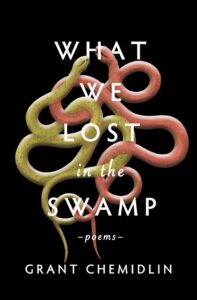
How Being a Writer Broke (Then Healed) My Queer Little Heart
Grant Chemidlin on Finding Poetry In the Process of Coming Out
In 2004, I was trying very hard to maintain my status as a masculine straight-jock-bro in the circus that is middle school, doing anything and everything to suppress the subconscious thoughts that were just starting to bubble up to my surface. I loved only two things: writing and scary movies. And even though watching Sarah Michelle Gellar battle globs of hair in The Grudge left me sleepless for two nights, I decided I wanted to write my very own horror novel.
I poured hours and hours into it, typing away, pretentiously telling friends I was “too busy” to hang out because I was actualizing my destiny of becoming the next Stephen King. By the end, I had a whopping 70 pages…double-spaced, size 18 font…but still, 70 pages! It centered on a young girl named Caitlin, who finds out her uncle, a mailman, was viciously attacked while delivering a package to a creepy, dilapidated house. Naïve, horror-cliché Caitlin decides to go visit this house…alone. Of course she ends up trapped, haunted by a dead family with a tragic backstory who keep trying to kill her. Eventually, she’s rescued by this handsome, mysterious man, who (spoiler) ends up being the bad guy. And in an absolutely wild tonal shift, things start to get hot and heavy very fast.
With each poem, the world, my world, becomes a little clearer to me, a little more colorful.
Because I don’t have the actual writing anymore, I’ve rewritten how I remember these scenes sounding in my head. You tell me if my “totally straight” 13-year-old self had a few things to work through:
Caitlin looks into his eyes. Beautiful pools of crystal blue. Fingers tracing down his cheek, taking in his rough stubble. She steps closer. He wraps his thick, muscular arms around her waist. His touch, gentle but electric. He undresses, seductively slipping off his t-shirt; his denim jeans falling to the floor, revealing huge, bulging…calves.
Anyway, you get it.
When I had finally finished writing, I was so excited. I printed out the manuscript and marveled at the mountain of paper birthed straight from my genius. Voraciously, I read through every page and as soon as I was done, I nearly vomited. Shame’s divine vacuum cleaner switched on, and every ounce of pride and joy I had was suddenly sucked from my body, replaced with an overwhelming fear. Thoughts can be concealed, but once written on the page, become a kind of proof. What was inside me was now outside me, where it couldn’t be controlled, where it could be seen by someone else. I became so paranoid of being discovered, so unwilling to accept what I had written, I deleted the Word document and tore up every last one of those 70 pages. And from that point on, I stopped writing stories all together. I buried my love for writing because I couldn’t handle its truths. My truths.
For the next decade, my subconscious, a little pink octopus, shot inky clouds across my mind any time I’d try to dive deeper. During my last year at Villanova University (nicknamed Vanillanova for its incredibly white, incredibly straight student body), I took a Video Production class, where I met Professor Hezekiah Lewis, whose infectious passion for storytelling relit a fire in me. By the end of the year, while my peers were out partying, I was up all night editing, reshooting scenes for the short film I had written and directed for class. I was so enthralled with storytelling again that the day after graduation, with encouragement and wisdom from Professor Lewis, I jumped in my car and moved across the country to Los Angeles.
Each word allowed out, instead of kept inside, makes me lighter, able to float.
Even in a new city though, even with my newfound passion, taking classes at The Writing Pad, participating in a writers group, something still wasn’t clicking. The scriptwriting wasn’t flowing. The main characters (mostly straight men) felt more like scarecrows than actual people (not so far off from my flannel-wearing self). I started to become more and more frustrated, more and more depressed. Moving to Los Angeles started feeling less like a new beginning and more like a retreat from something I didn’t want to deal with. So, I did what all queer people have to do eventually and faced my greatest fear: the light. At age 25, I finally came out, slow and steady. I started seeing a therapist to sort out my past and to try and repair my broken relationship with writing. She suggested trying poetry, just for fun, and I’ve been in a deep, all-consuming love ever since.
Poetry gives me this specific feeling, like every time I read a new poem, or write a new poem of my own, I’m removing a thick, crumbly brick from the sky-high wall I built as a kid. With each poem, the world, my world, becomes a little clearer to me, a little more colorful. I feel inspired and hopeful, more curious, more limber in my own body, more willing to write about anxiety, my first date with a man, coming out to my family. I can spill all my thoughts and memories onto the page; be as brave and brash and sexy as I want. I can break a line and leave a reader in suspense, wanting more. I have power and agency and space to sprawl even if it’s only me who ever reads it. Each word allowed out, instead of kept inside, makes me lighter, able to float.
I know it would be easy for me to look back and feel like all those empty years were lost; time I could have spent writing, learning, honing my voice, maturing as an artist. But I don’t let myself go there. Instead, I look around at where I’m at: I’m here. I made it, even if my erotic horror novella didn’t—though, who knows, maybe I’ll rewrite it. Call it You’ve Got Male. Something silly, because writing is silly, and I’m silly, and being silly means being deadly serious about joy.
__________________________________

What We Lost in the Swamp by Grant Chemidlin is available from Central Avenue Publishing.
Grant Chemidlin
Grant Chemidlin is the author of What We Lost in the Swamp (Central Avenue Poetry, 2023), a finalist for the Lambda Literary Award for Gay Poetry. His newest collection, In the Middle of a Better World, will be published by Central Avenue Poetry in February 2026. Recent poems can be found in The Los Angeles Review, Palette Poetry, Laurel Review, Quarterly West, and the Academy of American Poets, among others. Grant lives in Los Angeles with his husband and cat, and teaches poetry with PocketMFA and the Poetry Society of New York



















